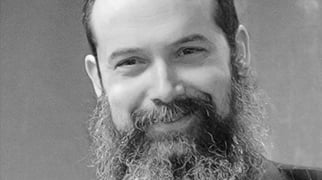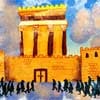Am I a radical? I didn't think so — until a recent telephone conversation I had with a newspaper reporter.
The journalist had called seeking my comments on a news item. Since he represented a Jewish newspaper, our conversation soon shifted to a discussion of Jewish ethics.
As the conversation progressed, we began to touch upon sensitive issues like sanctity of life, abortion, martyrdom, etc. In classic journalistic style, the fellow tried to probe the extent of my conviction to Jewish values.
He posited that values are great, but that they sometimes have to be set aside because of real life circumstances. In this guy's world, all principles were ultimately subject to concession — in the right circumstances. With his questions, he was trying to define my "price" for conceding on Jewish values.
I emphatically stood my ground. I explained that Judaism isn't just a "lifestyle" or an academic pursuit. I consider it my basic raison d'etre, my lifeblood. It isn't just something I practice, but what defines my very being. And my essential identity isn't for sale.
True, certain circumstances might lead me to set aside a specific law or principle. But I'll only do that if Jewish law itself prescribes that waiver.
A simple example: Jewish law forbids me to use the phone on Shabbat. However, were I (G‑d forbid) to experience a life-threatening emergency on Shabbat, I would absolutely call an ambulance. To the uneducated observer, that would seem to be a case of setting aside a Jewish value (a phone-less Shabbat) for a price (my health).
But that would be an incorrect observation. I value Jewish law and Jewish principles absolutely. I see them as a user's guide to life — not a code superimposed over "real life." If I see an apparent contradiction between Judaism and my life necessities, I'll look to Judaism — not my own instincts or desires — for guidance in the reconciliation.
I'll call that ambulance because Jewish law itself prescribes that we suspend a Shabbat law to (potentially) save a life.
The important distinction: I'm not temporarily ignoring Jewish law, I'm fulfilling it by picking up the phone.
Back to my conversation with the reporter. Those who know me (and this guy didn't) will agree that my decibel level tends to rise when I'm speaking about things that are important to me. The volume of my voice, coupled with the content of my views, is probably what led the reporter to blurt out: "You're pretty radical!"
I took that as a pejorative comment, and explained that I don't see myself that way. After expressing a hope that we someday meet and better acquaint ourselves, the phone call ended on a friendly note.
A few hours later, I read an article about Shiites celebrating in Kirbala, Iraq. They were flagellating themselves and some were literally cutting their heads with knives. In my mind, such self-mutilation is proscribed by the Torah and pretty far-out.
Interestingly, the article wasn't only about Iranian Shiites living without running water or political freedom. There was an interview with a seemingly normal eighteen-year-old from Queens. He was an American-born, public high-school teenager, from a Shiite-American family. He spoke passionately about his experience with this ritual — right here in New York. He spoke with fervent faith about his desire to forego pleasure — or experience pain — for G‑d.
Two facts hits me like a lightning bolt: A. I respected his devotion to his faith (although Judaism rejects this particular principle of that faith). B. My initial reaction had been to dismiss him as a radical... just as the reporter had done to me. It dawned on me that people probably looked at me the same way that I, instinctively, had viewed him.
Honestly, it hurt. I had met a radical, and he was I.
For the rest of the afternoon, I began to think about my newfound identity. I began to consider what made me a radical in this reporter's eyes. It was apparently my passionate devotion to principle. Mind you, he didn't disagree with the principle; he just felt that I took it too far.
I came to the conclusion that he was correct: I'm not normal (if there's such a thing as "normal").
I think I know what "normal" is. I grew up in a normal middle-class neighborhood: West Orange, NJ. It wasn't an "Orthodox" neighborhood. My friends on the block weren't "Orthodox." They were just normal American (mostly Jewish) kids. My neighborhood — outside my Chassidic home — was very much middle-of-the-road. "Normal."
That "normal" America valued philosophical and theological moderation. Sure, you can take a position; just don't take it too far. Ideals were important — in moderation.
Subscribe to an ideal. That's good. But passion for an ideal? That made you a bit different, a bit extreme. You weren't exactly "normal."
It struck me that this reporter could have grown up on my block in West Orange. He valued moderation in Judaism. I, conversely, was passionate about Judaism — my lifeblood. In fact, I fear a passionless Judaism, because I see that as a lifeless Judaism. So I was radical.
For the record, I should state that I value moderation. I try to practice it and I teach it to my kids. Discipline and moderation is an important tool for life. But so is passion. The question is which situations call for which tool.
To understand this point, let's look at a Torah law (bear with me here, it may seem arcane, but it makes the point).
The Torah mandates the following practice: When we slaughter an animal, we have a specific process (called shechita) whereby we quickly slit the trachea and esophagus with a smooth and very sharp knife. Afterward, we are to take some dirt and cover some of the blood that drains from the animal. There is even a special berachah (blessing) for this blood-covering ritual.
This covering of the blood may be seen as a sympathy gesture. After all, we've just killed an animal. Although we believe in the propriety of (humanely) killing an animal for food, we don't want to ignore the loss of an animated life. We don't want to become calloused. So, we cover the blood, expressing respect for the life we took.
That's a simple way of interpreting this mitzvah's moral lesson. But the more one studies these laws, the more one realizes that there are questions, some facts that don't seem to fit. For example, how does one explain the fact that the obligation to "cover the blood" applies only to the slaughter of an animal for normative, mundane use. For example, if a chicken is slaughtered to provide people with chicken cutlets, the animal's blood had to be covered).
However, if the animal is being slaughtered as a korban ("offering") in the Beit Hamikdash (the Holy Temple) — which would have been a sacred exercise — no blood-covering was necessary.
Why not? Why do we need to exercise sensitivity when it comes to killing for dinner but not in slaughtering for G‑d? It actually seems counter-intuitive. One would hope that we'd have a greater sensitivity while dealing with ritual matters. How does this all translate into a lesson for life?
Here's an angle from Chabad Chassidic thought:
Blood is the basic juice of life. Blood is what enlivens a hunk of meat, transforming it into a human body. To an extent, blood is also a barometer of our emotions: it "drains" when we're frightened, rises when we're excited, "boils" when we're angry. Blood symbolizes life and its animation, life and its passions.
So blood equals passion. We can all appreciate that passion is a critical human function. Passion is our capacity to vivify and energize a specific act, bringing it to life. When you do something with passion, you do it with soul.
One of life's critical questions is: Where do you direct your passion?
When I invest my passion in self-absorbed self-gratifying material pursuits (my food, my car, my clothing, etc.), I'm abusing it. I'm taking a wonderful resource (passion) and using it to expand my own ego.
Sure, one is permitted to partake in life's pleasures. But passion should be reserved for higher ideals. I should be passionate about the need to find meaning in my existence, passionate in my desire to connect with the Divine, passionate about the need to correct the world's imbalances and distortions.
In real life, these two passions are actually contradictory. The more passionate I am about self-gratification, the more I strengthen my ego. With a fortified ego, it becomes much harder to be passionate about loftier ideals. The reverse is also true. If I am passionate about my G‑d-given destiny, then I'm less likely to become passionate about feeding my own ego.
Back to the mitzvah of the covering of the blood with dirt. Bear in mind that blood symbolizes passion, while dirt is a symbol of humility.
When we experience blood in the slaughter of a chicken for dinner (read: when we experience passion in pursuit of our self-centered, mundane needs) then we have to take dirt and cover the blood (read: we have to mute that passion, smothering it with our own sense of Divine-duty and higher ideals. We have to achieve perspective of our own passions).
However, when we experience that blood in the slaughter of an animal at the Temple (read: when we are passionate about holy pursuits), then there is no need to cover the blood (that passion is self-transcendent, not self-absorbed, and there's no need to temper it).
So passion is good, if it's invested in the right endeavor. Obviously, passion needs to be channeled in the correct way. In addition, it's difficult to maintain objectivity about the proper focus of passion. So, once again, we need the Torah, life's user's manual, to define suitable places to devote our passions.
The reporter had called me on a Friday. After thinking a lot about the topic, I spoke about the above idea at services on Shabbat morning (the weekly Torah reading touched on the blood-covering idea). Then I pursued it further at our regular Sunday morning discussion group.
Following the discussion, a knowledgeable friend enlightened me as to the Webster's definition of "radical." In my experience, the common usage is one that means "extreme." But the first definition listed in Webster is "of or going to the root or origin." That sounds interesting. Being radical means getting to an ideal's essence? Radical about life means getting to the core of life?
I can get into that. I can really get into that.







Join the Discussion